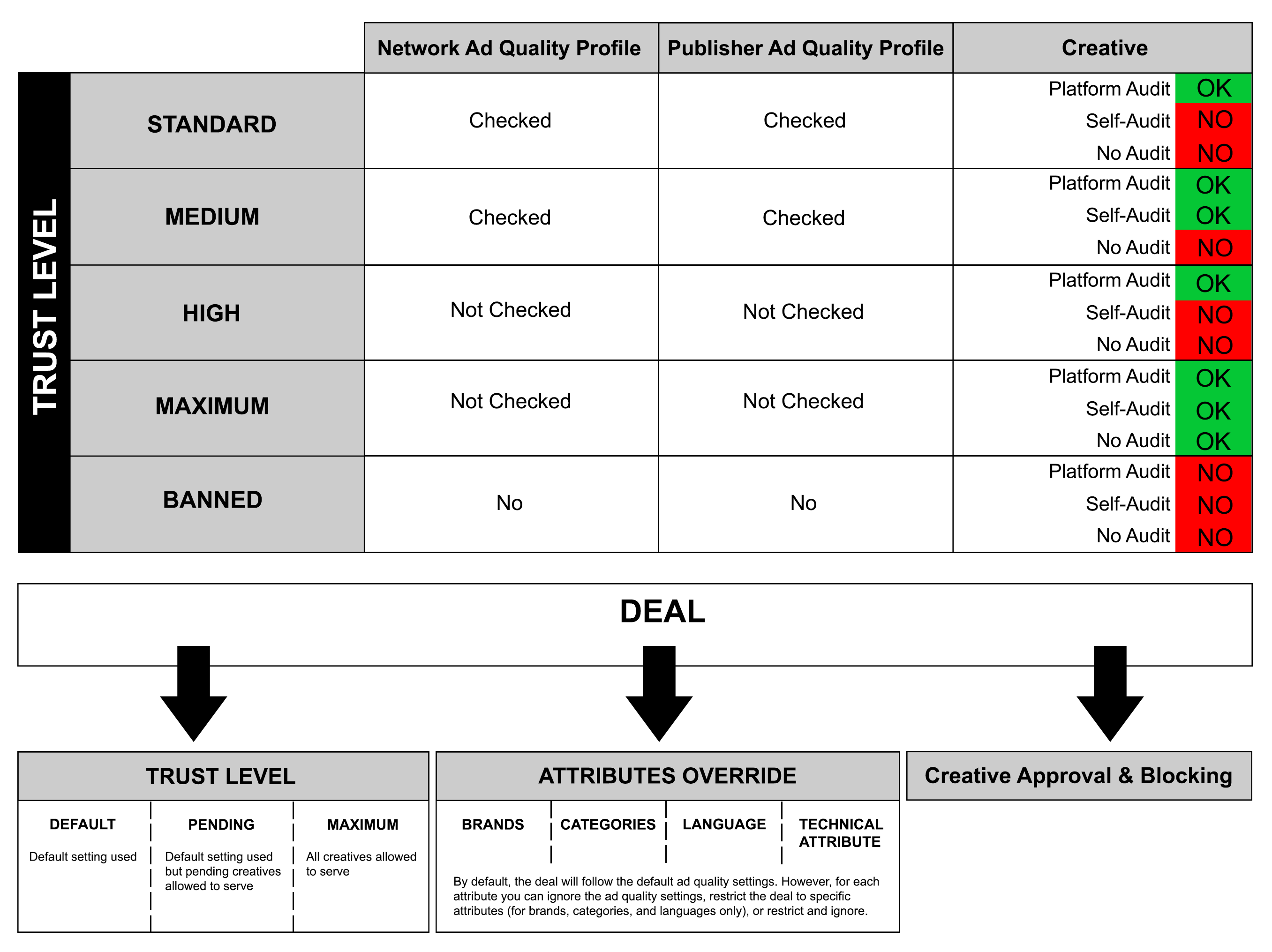Define ad quality rules
Publishers want to ensure that advertisements served on their websites don't take away from website content or the user's experience. Publishers are also concerned with serving competing ads on their sites. Since upholding your publisher's ad quality standards is vital to your relationships with them, Xandr makes it easy to do so.
Ad quality profiles are set at two levels: the network level, which is applied to all publishers, and the publisher level, which allows different settings per publisher. There are a variety of ad quality standards options that you can choose from. These are discussed in greater detail in Ad Quality Standards below.
For a list of our baseline platform-wide creative standards, see "Creative Standards and Auditing" in documentation. To change your ad quality profile through the API, see Ad Profile Service.
Basic options: Network-level ad quality
Tip
Xandr recommends that all Supply Partners set up a single Network-level Ad Quality Profile to apply to all publishers that traffic via the network.
To update your network-level ad profile via the API, you can use the Ad Profile Service.
Note
Your Network Ad Profile will apply to all publishers. Any other ad profiles or rules you apply to a publisher will have an AND relationship with your network ad profile. You cannot override your network ad quality restrictions at the publisher level.
Here's an example of how it works: In your global ad profile, you banned Network A, but in a conditional rule for FancyCrackers.com, you set Network A to standard trust. Since Network A is banned in the global ad profile, Network A will still be banned for FancyCrackers.com.
Advanced options: Publisher-level ad quality
At the publisher level, you can apply publisher-specific ad quality profiles. You can either create a custom ad quality profile or use a template created at the network level.
Base Rule: If you choose to create a base rule, it will be your catchall rule for that publisher in addition to the global ad quality profile settings. This rule will always have a priority of 1. You can create a base rule in the Publisher Manager.
Conditional Rule: Conditional Rules are ad quality profiles that have targeting settings and priorities. You can target based on geography, session frequency, sizes and placements. In order to create conditional rules you must go to the Ad Quality tab in the Publisher Tab.
Tip
When you work with publisher ad quality profiles, you have the option to create a Base Rule as a catchall rule and conditional ad quality rules that have targeting and priority settings. Only one publisher ad quality rule will be applied at any given time.
Here's an example of how it works: You have a relationship with FancyCrackers.com and they have different ad quality standards based on the country the impression is served in. You can create different conditional rules based on the geography of the impression.
Publisher ad quality standards options
You can create ad quality profiles for your publishers based on:
- Buyers
- Brands of creative landing pages
- Creative categories
- Language of the creative
- Technical attributes of the creative
For information about read-only API services that you can use to retrieve information for use in your ad quality profile, see:
Tip
Brands, Categories, Language, and Technical Attributes can also be blocked through individual bid requests. For more information, see Bid Request.
Note
If an Ad Quality (AQ) is set as "default_brand_status": "banned" but the parent brand is set as "status": "trusted", the child brand overrides the setting in "default_brand_status" and it will be able to serve unless it is explicitly banned in the Ad Profile's brand override list.
Platform buyer trust levels
For Platform buyers who purchase inventory via the Xandr Platform, you can select from a spectrum of Trust Levels options. Trust Level is a feature that allows sellers to dictate which buyers they do and don’t trust to serve ads on their inventory.
| Trust Level | Implications |
|---|---|
| Standard | Apply ad quality standards, require Platform audit. |
| Medium | Apply ad quality standards, trust buyer self-classification. |
| High | Bypass ad quality standards, require platform audit. |
| Maximum | Bypass ad quality standards, do not require audit. |
| Banned | Ban all creatives. |

Note
The difference between trusting buyer self-classification and requiring a platform audit is that you trust that buyer to correctly self-classify all creatives that they do not opt into Xandr audit. When uploading their creatives and tags, buyers with this classification are asked to confirm that they have self-classified any creative for compliance with Xandr's creative standards.